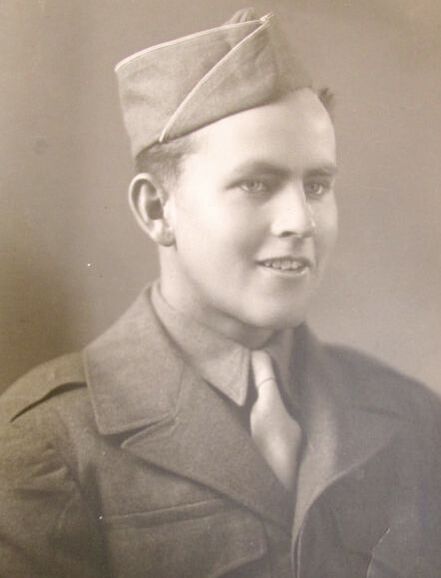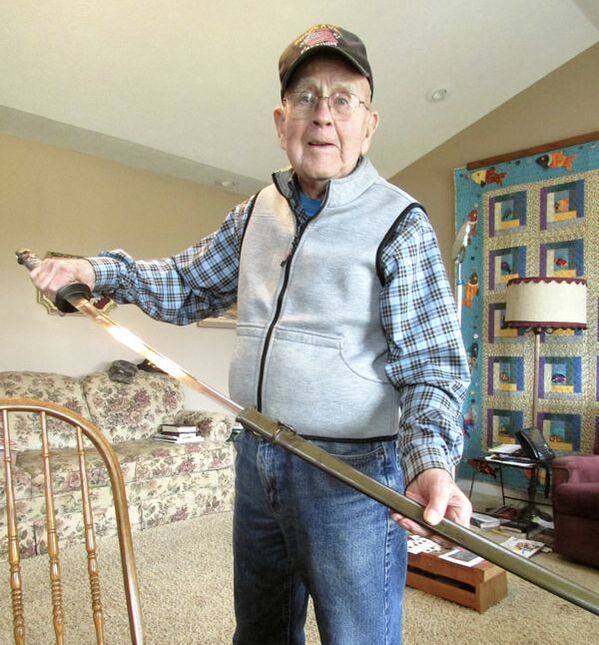Cassville veteran recounts experiences in the Pacific
November 11, 2020
Sheila Harris
“I bet you’ve never seen anything like this,” said 96-year-old Robert Ryder, of Cassville.
As he unsheathed the Japanese Samurai sword he held in his hands, its burnished blade glinted in the sun cast by the overhead skylight. I agreed that I’d never seen one before.
Nor had I seen - not in person, at least - a Japanese flag, two of which were displayed in a cabinet in his home.
Ryder, one of perhaps only a handful of living WWII veterans remaining in Barry County, was happy to share a few stories with me.
“One of the Japanese flags,” he said, as he pointed toward the cabinet, “I bought it for $6 from a disgraced Japanese kamikaze pilot, who was unable to follow through with his mission.”
Ryder opted not to tell me how he had procured the sword.
Born in Pioneer, Ryder was a 1942 graduate of Wheaton High School. After graduation, he accepted a job with Elkins Butane Gas Company, where he gained the experience to qualify as a combat engineer when he joined the military in 1944, after first accepting a deferment for which he was eligible because his job was considered essential.
“I let the deferment expire,” Ryder said. “Some of the guys were giving me a hard time, and I decided it was time for me to join the draft like others were doing.
“I was inducted into the service in Fort Leavenworth, Kansas, in 1944,” Ryder said.
After shipping out, his first stop was in New Guinea, where his troop spent a few months mostly just waiting to ship out again, according to Ryder.
“In 1945,” he said, “I sailed into Lingayen Gulf in the Phillipines and became part of the 556th Heavy Poton Engineer Battalion.
“We mostly built bridges where we were stationed in Manila,” Ryder said. “We spent a lot of our time in the water, and mosquitoes and flies were a big problem. A plague of flies hit us after Filipinos began dumping the bodies of dead Japanese soldiers into the river where we were working. The flies got so bad it was hard to even eat our food. Then the Air Force began spraying DDT and that put a stop to the fly problem.
“I got malaria three times while I was there, in spite of the fact that we took an atabrine tablet every day,” he continued. “The atabrine was supposed to prevent it, but it didn’t always work.
“Once when I was in the hospital with a fever, they brought in two guys who had bought poison liquor from some Chinese vendors in Manila. The doctors pumped their stomachs and they stayed the night in my room, one on each side of me. They were in lots of pain, so they made a lot of racket. When daylight came, one of them was dead and the other one was blind,” Ryder said. “We’d been warned not to buy whiskey from the Chinese. I guess there was a good reason for it.”
According to Ryder, his closest brush with death was probably the time he was airing up the floats on a bridge in Manila, and a sniper fired toward him.
“I didn’t hear the shot, until after I’d felt the bullet whiz past my right ear,” he said. “I immediately dove into the water.”
Ryder said one of his bouts of malaria kept him from shipping out to come back home with his unit in 1946.
“I had to wait until I was well,” he said, “which was about three weeks later.”
After landing in Seattle, the troops were welcomed, in part, by an Olympic Dairy truck, Ryder remembers.
“They gave each of us a quart of milk,” he said. “That was the best milk I’d ever had. We hadn’t had milk for a couple of years, and we all just stood there and drank it.”
Ryder eventually made it back to his family’s home in Pioneer and went back to work for Elkin’s Butane in Wheaton.
“By that time, I was thinking I might want to start a family of my own,” he said, “but it seemed like all the girls I used to know were gone. Then, a buddy of mine in Purdy introduced me to his wife’s sister, and I knew she was the one. We really hit it off.”
Robert Ryder and Marjory Young were married and bought a farm south of Purdy, where they raised two children.
Ryder said, at 96, he’s forgotten a lot of details about his time in the military; some of it, he suspects, might be for the best.
“They wanted me to join the reserves after I got back home from Japan,” he said, “but I’m glad I told them no. Those who did join ended up fighting in the Korean conflict and I always felt sorry for them. They had to turn right around and leave the homes and families they’d just started.”
Ryder, whose wife passed almost two years ago, credits part of his longevity to never having smoked.
“They gave us free cigarettes in the military,” he said, “but I never smoked them. I sold them to other guys who did smoke, though.”
“I bet you’ve never seen anything like this,” said 96-year-old Robert Ryder, of Cassville.
As he unsheathed the Japanese Samurai sword he held in his hands, its burnished blade glinted in the sun cast by the overhead skylight. I agreed that I’d never seen one before.
Nor had I seen - not in person, at least - a Japanese flag, two of which were displayed in a cabinet in his home.
Ryder, one of perhaps only a handful of living WWII veterans remaining in Barry County, was happy to share a few stories with me.
“One of the Japanese flags,” he said, as he pointed toward the cabinet, “I bought it for $6 from a disgraced Japanese kamikaze pilot, who was unable to follow through with his mission.”
Ryder opted not to tell me how he had procured the sword.
Born in Pioneer, Ryder was a 1942 graduate of Wheaton High School. After graduation, he accepted a job with Elkins Butane Gas Company, where he gained the experience to qualify as a combat engineer when he joined the military in 1944, after first accepting a deferment for which he was eligible because his job was considered essential.
“I let the deferment expire,” Ryder said. “Some of the guys were giving me a hard time, and I decided it was time for me to join the draft like others were doing.
“I was inducted into the service in Fort Leavenworth, Kansas, in 1944,” Ryder said.
After shipping out, his first stop was in New Guinea, where his troop spent a few months mostly just waiting to ship out again, according to Ryder.
“In 1945,” he said, “I sailed into Lingayen Gulf in the Phillipines and became part of the 556th Heavy Poton Engineer Battalion.
“We mostly built bridges where we were stationed in Manila,” Ryder said. “We spent a lot of our time in the water, and mosquitoes and flies were a big problem. A plague of flies hit us after Filipinos began dumping the bodies of dead Japanese soldiers into the river where we were working. The flies got so bad it was hard to even eat our food. Then the Air Force began spraying DDT and that put a stop to the fly problem.
“I got malaria three times while I was there, in spite of the fact that we took an atabrine tablet every day,” he continued. “The atabrine was supposed to prevent it, but it didn’t always work.
“Once when I was in the hospital with a fever, they brought in two guys who had bought poison liquor from some Chinese vendors in Manila. The doctors pumped their stomachs and they stayed the night in my room, one on each side of me. They were in lots of pain, so they made a lot of racket. When daylight came, one of them was dead and the other one was blind,” Ryder said. “We’d been warned not to buy whiskey from the Chinese. I guess there was a good reason for it.”
According to Ryder, his closest brush with death was probably the time he was airing up the floats on a bridge in Manila, and a sniper fired toward him.
“I didn’t hear the shot, until after I’d felt the bullet whiz past my right ear,” he said. “I immediately dove into the water.”
Ryder said one of his bouts of malaria kept him from shipping out to come back home with his unit in 1946.
“I had to wait until I was well,” he said, “which was about three weeks later.”
After landing in Seattle, the troops were welcomed, in part, by an Olympic Dairy truck, Ryder remembers.
“They gave each of us a quart of milk,” he said. “That was the best milk I’d ever had. We hadn’t had milk for a couple of years, and we all just stood there and drank it.”
Ryder eventually made it back to his family’s home in Pioneer and went back to work for Elkin’s Butane in Wheaton.
“By that time, I was thinking I might want to start a family of my own,” he said, “but it seemed like all the girls I used to know were gone. Then, a buddy of mine in Purdy introduced me to his wife’s sister, and I knew she was the one. We really hit it off.”
Robert Ryder and Marjory Young were married and bought a farm south of Purdy, where they raised two children.
Ryder said, at 96, he’s forgotten a lot of details about his time in the military; some of it, he suspects, might be for the best.
“They wanted me to join the reserves after I got back home from Japan,” he said, “but I’m glad I told them no. Those who did join ended up fighting in the Korean conflict and I always felt sorry for them. They had to turn right around and leave the homes and families they’d just started.”
Ryder, whose wife passed almost two years ago, credits part of his longevity to never having smoked.
“They gave us free cigarettes in the military,” he said, “but I never smoked them. I sold them to other guys who did smoke, though.”


